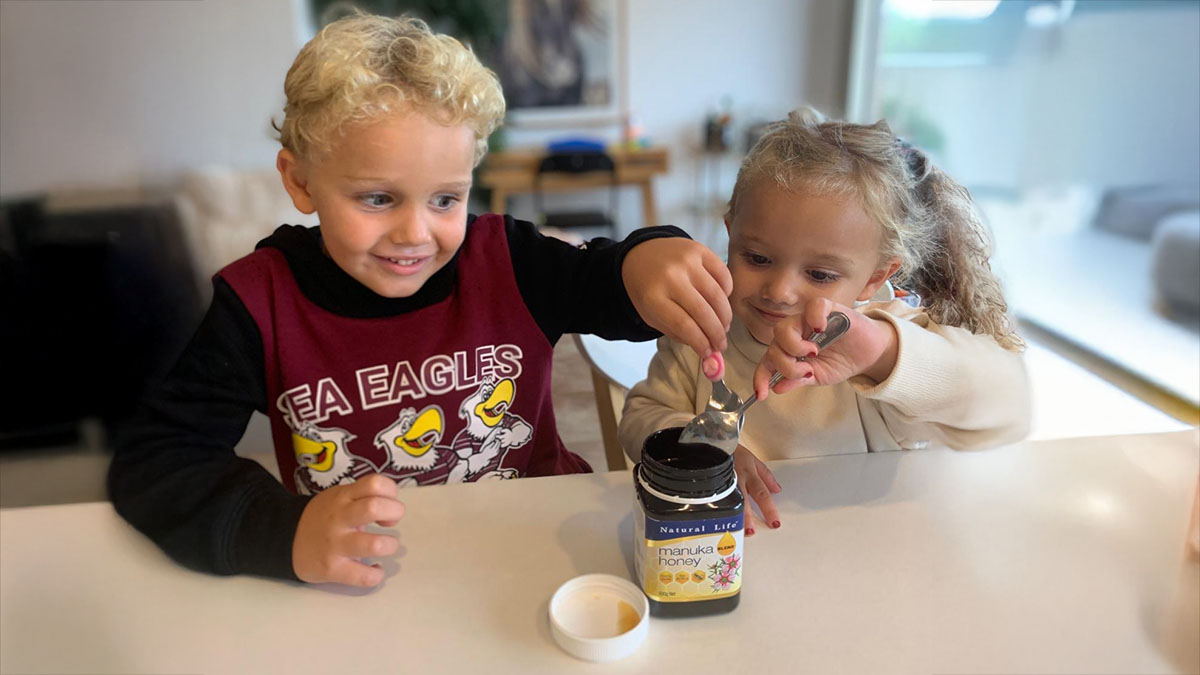When it comes to your child’s nutrition, real food matters. Here’s why bee pollen and Manuka honey can naturally support immunity, energy, and everyday wellness—without the nasty synthetic stuff.
1. Packed with essential nutrients growing bodies need
Bee pollen is often called nature’s multivitamin for a reason—it contains one of nature’s most complete ranges of essential nutrients. We’re talking Vitamins A, B-complex, C, D and E, plus minerals like zinc, magnesium and iron, antioxidants, flavonoids, amino acids and enzymes.
These nutrients play a vital role in energy production, immune defence, brain development and even skin health. For growing kids, that means more natural support across every system—without the need for synthetic tablets. It’s a whole-food way to nourish your child’s body from the inside out.
2. Natural support for immunity and gut health
Manuka honey is more than just a sweet treat—it’s a functional food rich in a unique compound called MGO (methylglyoxal), which helps protect the gut and support the immune system. This compound, along with its natural prebiotic properties, can help keep little digestive systems balanced and resilient.
Especially during the colder months, Manuka offers a gentle, soothing way to help your child’s body defend itself—naturally. A spoonful a day can be part of a simple, everyday routine that supports immunity from the inside out.
3. No artificial fillers—just real food from the hive
Many multivitamins on the shelf are full of synthetic ingredients, additives and sugar to get kids to take them. Bee pollen and Manuka honey are different—they’re real, unprocessed foods that naturally contain what your child’s body needs.
Because they’re whole foods, they’re also bioavailable—meaning the nutrients are more easily absorbed and used by the body. It’s not just what’s in them, it’s how your body uses them that makes the difference.
4. They’re delicious (no bribes needed)
Getting kids to eat well can be a challenge—but not when it tastes this good. Manuka honey has a smooth, rich, caramel-like flavour that kids love, and bee pollen adds a soft crunch with a subtle floral sweetness.
You can mix them into yoghurt, blend them into smoothies, drizzle them on toast or even offer them straight off the spoon. No battles. No bribes. Just real, delicious food they’ll actually look forward to.
5. Backed by science and clinical naturopaths
Bee pollen and Manuka honey aren’t just your next wellness trends—they’ve actually been used for thousands of years in traditional cultures and modern science is finally catching up. Manuka’s MGO compound is now widely researched for its immune and digestive support, and bee pollen is studied for its dense nutritional profile.
Fun fact: The Māori people of New Zealand have used the Manuka plant for centuries—long before scientists discovered MGO. They brewed the leaves for respiratory relief and applied the honey to wounds, making it one of the oldest natural remedies still trusted today.
How helpful was this article?
Click on a star to rate it!
5 / 5. 3
Be the first to rate this post!
Related posts
Subscribe
Receive personalised articles from experts and wellness inspiration weekly!

